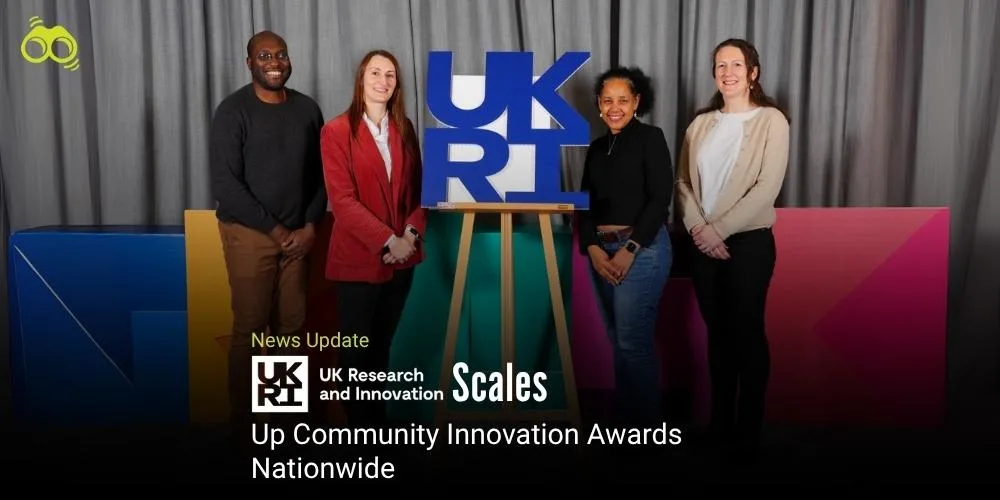Universities Drive Local Change Through New Round of Community Innovation Awards
Creative Communities Programme Scales Up Support for Arts and Humanities Initiatives
As part of a broader initiative to promote creativity and innovation throughout the UK, the Community Innovation Awards have been reopened for an additional 2025–26 cohort. This is announced by the Creative Communities programme, funded by UKRI via the Arts and Humanities Research Council (AHRC) and headed by Northumbria University. The most recent awards are an investment of almost £500,000 supporting research and the development of projects in all four countries of the UK.
The programme aims to examine how arts and humanities projects can make local communities more resilient and enable place-based innovation. It is concerned with the role of culture and devolution in promoting participation in community and cross-sector working. The new award winners will be engaged in a variety of projects that better represent the diversity and potential of the UK's creative industries. These include re-purposing vacant shopping space as creative quarters in Dundee, facilitating reconciliation through the arts in Belfast, and utilising craft to foster community coherence in Rochdale. Other initiatives will focus on cultural health in Kirklees, facilitating regeneration in Digbeth with assistance from the BBC, and creating new models of community journalism in Cardiff.
Key senior stakeholders within the programme have promoted the role of culture in enhancing wellbeing and powering economic growth. The Community Innovation Awards were described as assisting in the unlocking of new knowledge possibilities for academic research, policy, and public engagement. The programme has already collaborated with more than 100 partners and created a successful podcast series to disseminate learning.
Each recipient will create a case study, a policy paper, and a podcast episode to present their work. They will collectively create a Community of Practice network to exchange ideas and develop relationships across regions.
Six new projects have been funded:
- In Scotland, the University of Dundee will be working on a project about creative spaces and the regeneration of city centres.
- In Wales, Cardiff University will investigate how communities use news and storytelling.
- In Northern Ireland, Queen's University Belfast will collaborate with the National Trust to encourage belonging through heritage and ecology.
- In England, three universities, including Manchester, Huddersfield, and Birmingham, will prioritise craft, cultural strategy, and inclusive regeneration.
- The programme is located at Northumbria University, or the University of Newcastle upon Tyne, and is part of a wider £3.9 million investment in cultural research. It seeks to establish a robust evidence base for how local culture can drive growth, decrease inequality, and enhance access to opportunity throughout the UK.
Editor's Note
This is precisely the type of investment that the UK's cultural industry requires. The Community Innovation Awards, funded by UKRI and spearheaded by Northumbria University, demonstrate how arts and humanities can make actual change, not only in theory, but in life. These initiatives are not about creativity for its own ends; they are about harnessing culture to address issues, create connections, and nourish communities across the four nations. The impressive facts were from regeneration in Digbeth to craft in Rochdale, and journalism in Wales; every prize honours a profound sense of place and intention. It's welcome to see academic research not merely being used to produce papers, but to shape public environments, inform policy, and underpin creative industries where they are needed most. This program underscores that community engagement is central to innovation, not a peripheral activity. It highlights how cultural initiatives, when deeply integrated with local collaborations, can achieve lasting impact. By disseminating knowledge through case studies, policy briefs, and podcasts, learning becomes accessible and widely shared.
Skoobuzz observes that this represents a significant and well-timed step toward a more creative and inclusive future. The focus is not merely on funding individual projects but on empowering the individuals, communities, and concepts that offer valuable contributions.
FAQs
1. What is the UKRI Community Innovation Awards initiative?
The UKRI Community Innovation Awards are part of the Creative Communities programme, funded by the Arts and Humanities Research Council. These awards support creative projects that bring together researchers, local communities, and cultural partners to solve real-world problems and promote place-based innovation across the UK.
2. How are UK universities involved in community innovation?
UK universities play a leading role by working directly with local groups, councils, and cultural organisations. They help design and deliver creative projects that support social cohesion, cultural regeneration, and public engagement. Through academic research, they also provide evidence and ideas that shape policy and improve community outcomes.
3. Which universities are participating in the scaled-up awards?
The new round of awards includes six universities:
- University of Dundee (Scotland)
- Cardiff University (Wales)
- Queen’s University Belfast (Northern Ireland)
- University of Manchester, University of Huddersfield, and University of Birmingham (England)
- Each university is working on a unique project tailored to its region’s needs.
4. What impact do innovation awards have on local communities?
These awards help communities by turning creative ideas into practical solutions. They support local identity, improve public spaces, and encourage people to take part in cultural activities. The projects also help tackle issues like inequality, isolation, and lack of access to cultural resources.
5. How does Northumbria University support creative research?
Northumbria University, also known as the University of Newcastle upon Tyne, leads the Creative Communities programme. It supports creative research by managing partnerships, guiding project development, and building a strong evidence base on how culture can improve lives. The university also helps share learning through podcasts, case studies, and policy papers.














0 Comments (Please Login To Continue)